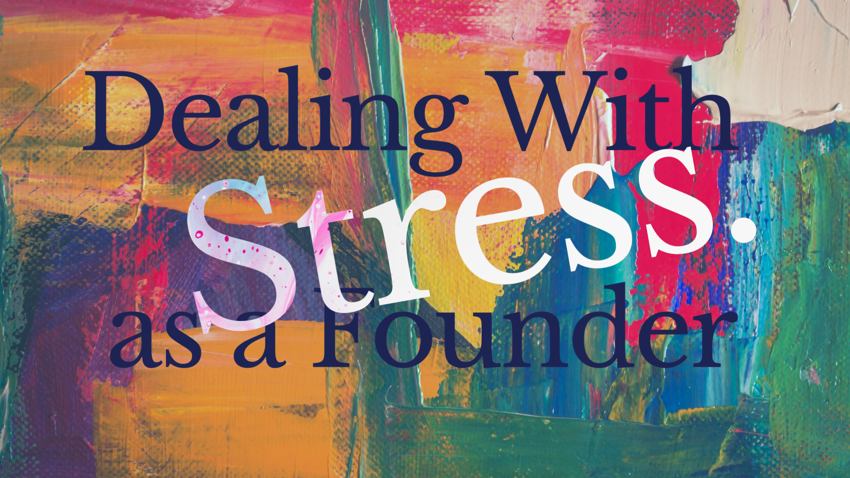
Stress is a common theme that runs through the lives of modern humans. Modernity has made our lives truly convenient. These days we have more convenience than necessity. We have endless options to satisfy our immediate gratifications. Anything we want to buy is just a click away. But modernity has also left us tired and exhausted. We are always working. All kinds of sensations keep our senses occupied 24/7. Intrusive media continue to cause relentless distraction. There is a little respite from this frenzy we call living. As a result, we are always stressed and anxious.
This is even more so for entrepreneurs. Being a founder, it comes with the territory. You always have too much to deal with. Now add every other challenge modern living brings to it.
Contrarily, in order to be effective and content in our life, we must be able to deal with our anxiety and stress. Stress is not only harmful to our productivity, and decision-making, myriad studies suggest that it is equally bad for our health and well-being. This is why it is critical for founders to pay close attention to their sources of stress and anxiety and develop a strategy to deal with them.
In an interview with Future Startup, we asked Frontier Nutrition Co-founder and CEO Eddie Bearnot, how he deals with the anxieties and stress that necessarily come with being a founder. His answer has some deep insights into dealing with our inner turmoils.
1. “Routine and community” are two things that help me to hold myself together at the end of a stressful week, says Eddie. “Life as a founder is chaotic and uncertain. For me, a fixed daily routine helps me take back control.”
This is such a beautiful antidote to our limitation as human beings to navigate ambiguity and lack of structure. We, humans, crave orders. We need structure and a system to operate optimally. When things are in disarray we lose our cool. It frustrates us. It increases our level of anxiety.
Psychologists suggest that putting together a routine that you follow daily helps reduce stress and anxiety because with a routine you live in the known. Many people follow a morning routine to set the tone of the day.
Routines are useful because it reduces our need for decision making thus reducing our cognitive load. When you don’t need to decide what to do waking up in the morning, it is liberating.
In the introduction of his excellent book Daily Rituals: How Artists Work, Mason Currey writes why routine makes sense and is necessary for discipline, productivity, and more:
“The book’s title is Daily Rituals, but my focus in writing it was really people’s routines. The word connotes ordinariness and even a lack of thought; to follow a routine is to be on autopilot. But one’s daily routine is also a choice or a whole series of choices. In the right hands, it can be a finely calibrated mechanism for taking advantage of a range of limited resources: time (the most limited resource of all) as well as willpower, self-discipline, and optimism.
A solid routine fosters a well-worn groove for one’s mental energies and helps stave off the tyranny of moods. This was one of William James’s favorite subjects. He thought you wanted to put part of your life on autopilot; by forming good habits, he said, we can “free our minds to advance to really interesting fields of action.” Ironically, James himself was a chronic procrastinator and could never stick to a regular schedule.”
2. The second component Eddie uses to deal with stress is: staying connected with his community and loved ones. “I schedule calls with friends and family several weeks in advance so that no matter what is going on day-to-day, I am able to stay connected and have something to look forward to”, shares Eddie. Staying in touch with our loved ones adds meaning to our life and enables us to endure difficulties that may come our way. “I find these relationships and conversations to be a great source of energy and inspiration.”
A sense of genuine connection is at the heart of our well-being. For entrepreneurs, who live a busy and challenging life, having a schedule to connect with loved ones can offer a replenishment to our spent-self at the end of a hectic week.
The critical importance of connection in dealing with mental health is well-regarded in psychological literature.
In fact, as self-determination theory holds, a genuine connection with other human beings is one of the three things human beings need in order to be content. The other two things are the need to feel competent and the need to feel authentic.
Connectedness is often defined as a feeling of belonging. Studies show that when we have deep social connections, we feel that we belong to a tribe - when we can count on others when we need them and others depend on us in their needs, we find meaning, we are happier and less anxious and we live longer.
Next time when you feel burdened give a call to your loved ones.
****
When we know what is waiting for us the next morning, it offers a sense of reassurance amid our hectic busy schedule. In a constantly changing world, this sense of control is critical for our mental well-being and productivity.
Similarly, when we know we have a community of people we can fall back on when things are not going exactly great and when we can regularly detox ourselves through heartfelt conversation with our loved ones, we feel that we belong and it offers us calm and confidence.
Develop a routine for your day. The structure is an effective antidote to anxiety. Invest in your relationships and community because we draw meaning from our community.
****
Read our interview with Eddie Bearnot here.
Originally published on 20 October 2020. Updated on 30 June 2023.
